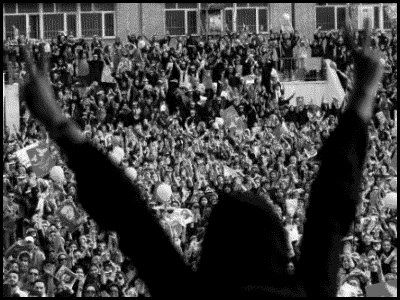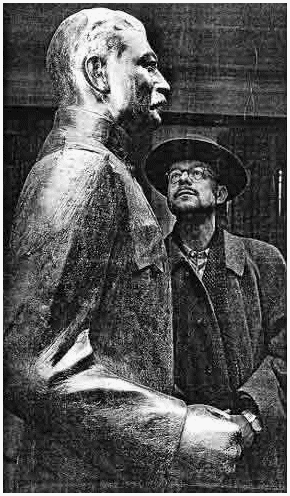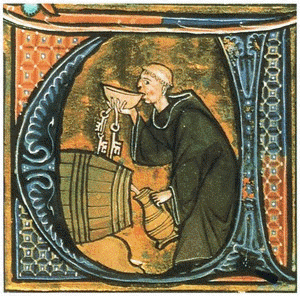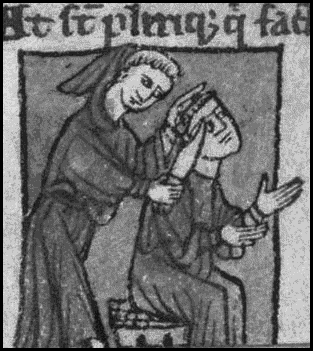The Cloud of Unknowing

Sebestyen's account dispels a number of misconceptions. He explains, for example, that 1989 was simply the tipping point for state structures which had been hollowing themselves out for years. This was clearest in Poland, where the independent labor union Solidarity had challenged the Communist authorities since 1980. Underlying the formation of Solidarity, and underlying the increasing difficulties in the other Peoples' Democracies, was simple economic failure. The Communist economies were incurably inefficient, and the regimes had taken on unsustainable levels of debt (borrowed from west European banks) in order to buy, if not support, then at least apathetic acceptance from their subject populations. Without these loans, the living conditions of workers in the Workers' States would have been even worse than they were.
But as economic failure worsened, the populations' apathy mutated into the formation of independent groups --- by definition, in the police state, an act of resistance. The message of resistance was explicit in some cases, like Solidarity in Poland or Democracy Now in east Germany; it was implicit in others, as in sly Czech groups like the "Society for a Merrier Present" and the "John Lennon Society," which enabled Vaclav Havel to declare himself a Lennonist.

The principal actors in the dramatic peaceful revolutions of 1989 were the people of those countries --- the many Poles, Czechs, East Germans, Hungarians, Romanians, etc. who took the big risk of forming the various independent groups, of going on strike, of demonstrating, and of publicly opposing one-party police state rule, the incessant fraud, and the denial of elementary human rights ... like the right to leave. The USA had virtually nothing directly to do with it. President Ronald Reagan did pronounce a few words about the East German Wall, but it was not his huffing and puffing which blew the wall down.
If any public figures deserve the credit for that, it was Prime Minister Miklos Nemeth and Foreign Minister Gyula Horn of Hungary. It was they who, in September 1989, opened the border between Hungary and Austria to the thousands of east Germans who had entered Hungary in order to escape to the west. This decision by the Hungarian government undermined not only the east German wall, and thus the power of the east German government, but also the iron borders which imprisoned the citizenry of all the Peoples' Democracies. Nemeth and Horn resembled Gorbachev in taking humane actions --- or refusing to take inhumane actions --- which led to the unforeseen final result of unravelling the whole structure of Communist rule.
At the time, another element in the West was conspicuous by its lack of support for the revolutions of 1989, a point acknowledged recently by Professor Tony Judt of NYU.
In a New York Review of Books memoir, Professor Judt ruefully recalled that the western Left, in which he had once counted himself, had been entirely AWOL in regard to this, the most authentic and exemplary peoples' revolutionary movement of the last fifty years. Here were vast, non-violent public demonstrations, like the Czechs who filled Prague's Wenceslas Square day after day in November of 1989. Yet the western Left, ordinarily so fond of the demonstration as an art form, did not even tip its hat. The reasons for this absence go back to the 14th century in one way, and to 1939 and 1956 in another.

Recall that in August of 1939, Stalin's Soviet Union and Hitler's German Reich had signed a pact of friendship, mutual aid, and, incidentally, the planned division of Poland between them. In September Hitler invaded Poland from the west and Stalin from the east. Britain and France, bound by treaty to Poland, responded by declaring war on Nazi Germany. But the Communist press in the west explained that History had rendered Poland (and thus by implication Poles) dialectically obsolete, and it dismissed the Allies' war effort against Nazi Germany as mere capitalist war-mongering. The Old Left thus affected that pose of phony pacifism (just how phony was revealed 21 months later) periodically used by the pop-Left ever since. The excommunication of Poland from History became the template for later attitudes toward east Europe in general.
The line changed abruptly, but temporarily, when Hitler double-crossed his Soviet associate and invaded it on June 22, 1941. In an instant, the language of fake pacifism evaporated, and the Allies' war-mongering was transformed into a great, brotherly crusade against Fascism. This lasted only until shortly after the end of WWII.
Then, Stalin imposed a Soviet-dominated police state in Poland, the very country he had joined Hitler in occupying in 1939. This move was not wildly popular in the USA, which has as many Polish names in the telephone books of Chicago and Cleveland as there are in those of Warsaw and Cracow.
But for the pop-Left there was nothing wrong here because, remember, History had already decreed that Poland didn't count. And since Uncle Joe Stalin was a well-known benefactor of humanity, opposing his takeover of no-account places like Poland was mere capitalist war-mongering (like, well, like World War II before June 22, 1941). Self-styled "progressives" were so offended by the Truman administration's failure to smother Stalin with love and kisses that they formed the Progressive Party in 1948 to run against Harry Truman.
A few years later, another event added to the Left's studied disregard for east Europe. In the autumn of 1956, a popular revolt in Hungary overthrew Matyas Rakosi's Soviet puppet regime, and the USSR quickly crushed the revolution, in a notably treacherous way. The Red Army first stopped outside Budapest, declaring a truce with the Hungarians; but then it seized the Hungarian representatives who had come to negotiate under the flag of truce, and, violating the truce, sent in the tanks to conquer Budapest. The Soviet Union's actions in Hungary confirmed decisively that Truman's earlier opposition to Stalin had been both principled and exactly right.
For the Old Left, Hungary became another case which demanded either rethinking (which many did), or, for those who preferred to avoid rethinking, the cloud of unknowing. Sure enough, The Nation magazine devoted zero reportage to the entire Hungarian revolution and its suppression, a failure that first puzzled and then shocked me back then, when I was a young college student and a regular Nation reader. For the next thirty-three years, devoted readers of The Nation would learn from its pages no more about Europe east of the Elbe River than they would about the moons of Saturn. No wonder that the revolutions of 1989 passed them by.
